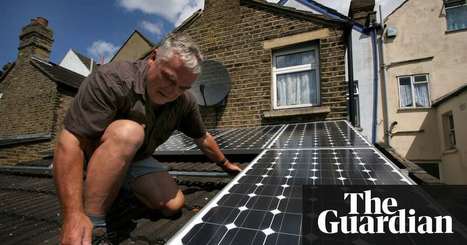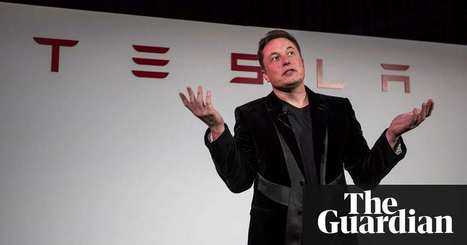Electric vehicles’ share of new UK registrations rises to 2%, still falling far short of Norway’s 48%
Get Started for FREE
Sign up with Facebook Sign up with X
I don't have a Facebook or a X account

 Your new post is loading... Your new post is loading...
 Your new post is loading... Your new post is loading...
Legal and General Investment Management wants to see more women on boards at the UK's top 350 firms.
Graham Watson's insight:
An interesting aside on the gender pay gap, with a large investor suggesting that shareholder activism might be one way of increasing the pressure on companies to promote able women faster.
Maharashtra in India has imposed a wide-ranging ban on plastic. How does that affect producers?
Graham Watson's insight:
Mumbai produces a remarkable amount of plastic waste each day, with much of it ending up polluting rivers, canals and going into the sea.
Thus, surely a ban on plastic makes sense? This BBC clip looks at the consequences of this seemingly straightforward solution, from the perspective of those involved in the plastic industry.
The UK's biggest coffee chain says it will recycle as many disposable cups as it sells by 2020.
Graham Watson's insight:
The issue of the disposability of coffee cups has become big news ad Costa have committed themselves to recycling in a big way, pledging to recycle as many cups as they sell by 2020. It's a headline grabbing target: is it achievable? Is it good economics?
Energy use for air conditioning, refrigeration and other cooling appliances expected to jump 90% on 2017 levels
Graham Watson's insight:
And thus it started. Climate change begetting further climate change.
Unless, of course, you factor in the incentives provided by the market to reduce the effects of climate change and to provide cheaper cooling and refrigeration.
Designed to disappear into the landscape, Britain’s vast super-warehouses also reflect a world in which we expect online purchases to arrive as if by magic
Graham Watson's insight:
Architecture meets economics. It might be "a shed the size of a town" to you. To me, it's a classic example of economies of scale.
With news that utility bills are on the rise, experts say technology will revolutionise both consumer use and generation of power
Graham Watson's insight:
The prospect of smart systems has been tantalising. We're promised that the future will herald cheaper and cleaner electricity. And that may be the case, but it's not really revolutionised the sector yet.
As the High Street comes under pressure and shopping habits change, what can be done to fill vacant shops?
Graham Watson's insight:
A fascinating look at the changing market dynamics of the High Street - with the seemingly ineluctable decline of retailing, this article considers where the High Street might go next. Apart from cafes, charity shops and mobile phone shops. Worth a read. But will it pan out this way? I suspect that tsome of these ideas have a very short shelf-life.
Stretch of road outside Stockholm transfers energy from two tracks of rail in the road, recharging the batteries of electric cars and trucks
Graham Watson's insight:
One of the worries about electric cars is the absence of the relevant infrastructure, but this Gaurdian article shows how Sweden is getting around this problem. Build the infrastructure in the roads themselves, courtesy of the rails embedded in the road. Clever fellas, the Swedes.
Having between five and 10 alcoholic drinks a week can take up to six months off your life, a study says.
Graham Watson's insight:
The IEA's Had of Lifestyle Economics, Christopher Snowden has already tweeted about this, but it's worth a read, if only to get your evaluative muscles working on a Friday. In the first place, how credible can the evidence be that drinking between five and ten drinks a week is the only causal factor that can take "six months off your life"? Secondly, if the evidence is incontrovertible, why are recommended drinking limits different depending upon where you live? And lastly, whilst everyone accepts that there are externalities, both positive and negative, associated with alcohol consumption, and that the latter probably do predominate, is this a case for intervention, which is this case seems to be moving towards Prohibition?
The international shipping industry is trying to reduce emissions.
Graham Watson's insight:
To what extent is shipping polluting? As much as Germany? That's quite a claim: the BBC's Reality Check investigates whether there's any truth in this. According to the International Council on Clean Transportation (ICCT), an independent environmental research organisation, the industry would be the sixth most polluting country in the world, if it were a country and this would apparently place it marginally ahead of Germany. Whoever thinks of this sorts of points of comparison?
As climate change forces a shift away from oil and gas, and electric vehicles become more popular, several commodities industry leaders explain how decarbonisation affects demand for resources.
Graham Watson's insight:
Another excellent FT clip looking at the impact of decarbonisation, but not with the usual focus on fossil fuels but the market for other commodities, notably various metals and rare earth metals. It's an interesting tale of changing patterns of demand, and, derived demand.
The increase follows that imposed by British Gas this week and will affect 1.3 million customers.
Graham Watson's insight:
See my earlier post about British Gas increase their energy prices: classic oligopoly market behaviour. I'm always minded of the nursery rhyme, 'Three Blind Mice' at this point. Look at the other members of the Big Six - and see how they run in due course. |
Brent crude has risen 1.7% – reaching its highest level since November 2014
Graham Watson's insight:
I love this sort of thing. a standard application of demand and supply theory, with a number of commodity markets reflecting changed market conditions.
Plan for a ban in England is announced as Commonwealth leaders are urged to tackle plastic waste.
Graham Watson's insight:
It appears that CHOGM is going to focus on the issue of plastic waste - with proposals for a ban on plastic straws and cotton buds, both of which contribute to marine pollution.
But rhetoric aside, is this not a 'drop in the ocean? For want of a better phrase...
It's not as easy to recycle your takeaway coffee cup as people may have thought.
Graham Watson's insight:
More on coffee cups - it seems remarkable but it's true, almost all takeaway cups are non-recyclable. This article explains why.
Firm struggles to hit targets for mass-market electric car after reeling from excessive automation and mounting pressure
Graham Watson's insight:
Electric cars are coming, just more slowly than Tesla would like. This has cost implications too, but you'd expect this to be borne by the company in the form of lower profit margins.
Poorest are hardest hit with many developing countries falling behind on cleaning up toxic air pollution
Graham Watson's insight:
The extent to which air pollution is a negative externality is made clear, and perhaps the extent to which it's a problem merits evaluation, in this Guardian article.
According to the Health Effects Institute, 95% of the world's population are exposed to dangerous air, making it the 4th largest global cause of death. Could you identify the external costs of air pollution?
Coffee in five charts: How coffee drinking varies around the world.
Graham Watson's insight:
Really nice industry summary of the coffee industry, looking at the biggest producers, consumers, coffee companies and so on. Equally, it also highlights who pay the most for their coffee. Within the EU, it's us.
American firms discuss how they are dealing with the looming trade war.
Graham Watson's insight:
The hidden consequences of President Trump's tariffs on Chinese goods, and the prospect of a looming trade war are dealt with in this BBC article. It gives a fascinating insight into the cost to individuals of the tariffs.
The economy is growing but our paychecks are not. That’s because employers have, over decades, built a political apparatus to hold down pay
Graham Watson's insight:
Article of the day: monopsony power in labour markets. This great piece explains why employers have monopsony power over employees and how the institutional features of many US labour markets have emerged to support this position.
Post-cold war politics shifted to the right, and ordinary people suffered. Mainstream parties need to know what went wrong, writes Guardian economics editor Larry Elliott
Graham Watson's insight:
Difficult to put this on a 'board' - it's an excellent overview of post-war debates about the nature of the state and where the current debate about austerity sits in that continuum. It is worth a read, if only to situate your understanding of a broader swathe of economic history.
Study says 40% of apprenticeship standards do not meet traditional on-the-job training definition.
Graham Watson's insight:
The government labelled the increase emphasis on apprenticeships as a focus on 'quality' but this article from the BBC suggests that the opposite has happened. But why would firms want to label "low-skilled jobs as apprenticeships"? Simple answer: they can pay lower wages - the National Minimum Wage (NMW) is less for apprenticeships than it is for ordinary workers.
Shares in Norwegian Air soar as IAG says it is considering a takeover bid.
Graham Watson's insight:
One of the longstanding features of the aviation market has been the question as to whether the low cost carrier (LCC) model could ever apply to long haul flights. And this BBC article suggests that IAG are convinced that it can, with rumours of them being about to bid for Norwegian Air. The move suggests that there are both economies of scale and potentially economies of scope, and that both can help drive down costs. However, some are concerned that the move might represent a reduction in competition in the sector and drive up the price paid by the final consumer. It will be interesting to follow-up this story; I suspect that there's more than a grain of truth to it.
The FT's Latin America editor John Paul Rathbone reports on what the appointment of a new president means for a country marked by economic stagnation and fading influence.
Graham Watson's insight:
A fascinating FT clip looking at the end of an era in Cuba, and the end of the Castro regime in a week's time. What will this mean for the Cuban economy as a whole, and entrepreneurs, in particular? The clip looks at the factors that explain why the Cuban economy is one-third smaller than it was thirty years ago, and uncertainty about future economic reform. |
































Drinks all round in Guardian Towers - as the UK joins the elite, in terms of the rate of growth of electric car sales, up 11% this year.
This is Guardian squared territory.